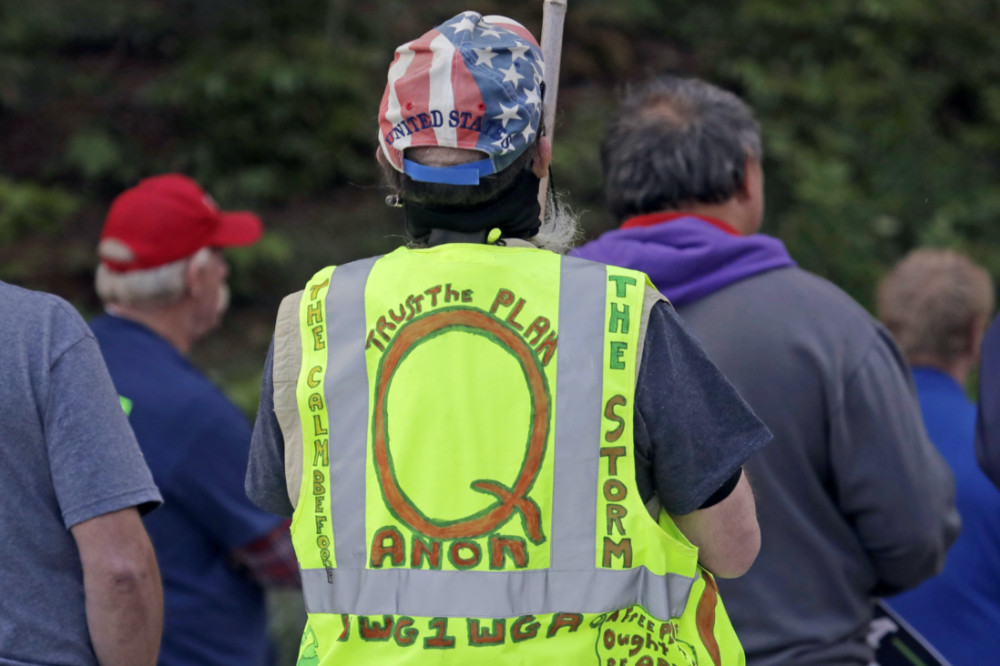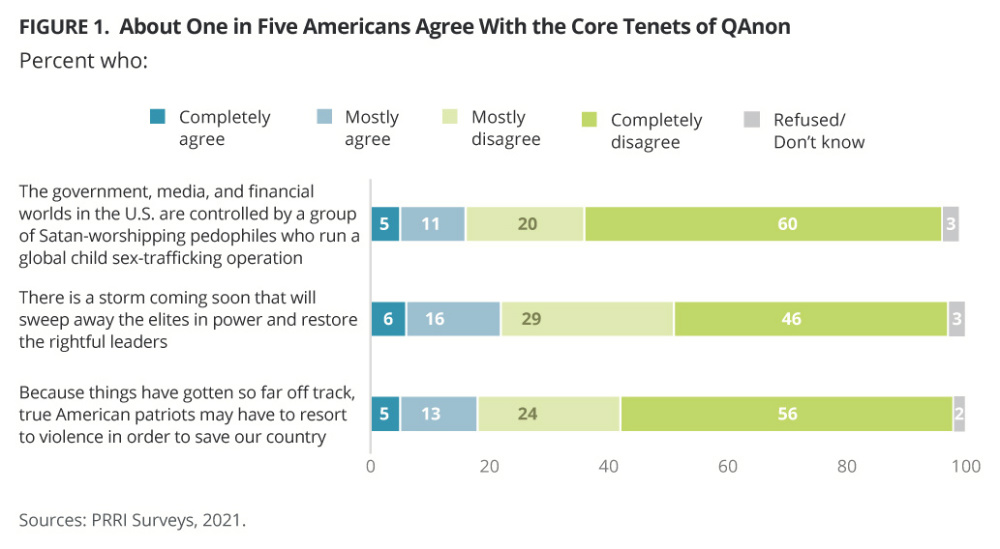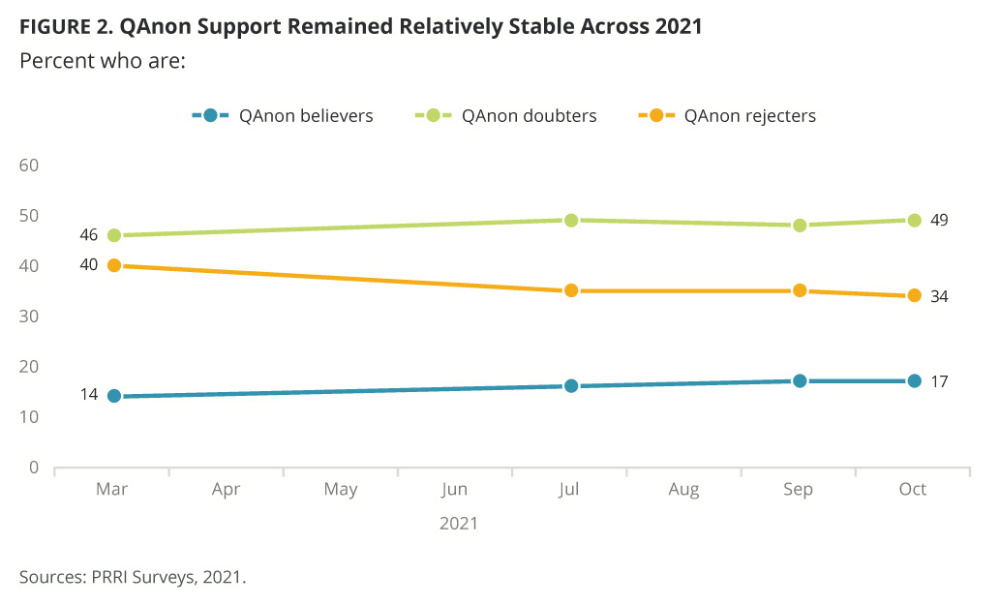A new study finds devotees of the conspiracy theory movement known as QAnon number in the tens of millions, a sizable coalition that claims a number of white evangelicals but draws from other religious groups as well.
And while QAnon believers are vastly outnumbered by those who reject or doubt their claims, researchers say they represent a politically motivated worldview that diverges sharply from the views of other Americans when assessing current events, such as the 6th January attack on the US Capitol last year.

A demonstrator holds a QAnon sign as he walks at a protest opposing Washington state’s stay-at-home order to slow the coronavirus outbreak on 19th April, 2020, in Olympia, Washington. PICTURE: AP Photo/Elaine Thompson.
The study, compiled from a series of surveys conducted by the Public Religion Research Institute in 2021, gauged Americans’ attachment to QAnon, whose followers are often loyal to former President Donald Trump, by asking whether respondents agreed with three statements associated with the movement:
1. The government, media and financial worlds in the US are controlled by a group of Satan-worshipping paedophiles who run a global child sex-trafficking operation.
2. There is a storm coming soon that will sweep away the elites in power and restore the rightful leaders.
3. Because things have gotten so far off track, true American patriots may have to resort to violence in order to save the country.
Those who completely or mostly agreed with these statements were dubbed QAnon believers, those who mostly disagreed were described as doubters and those who completely disagreed as rejecters. Researchers discovered 16 per cent of American adults – roughly 41 million people – were QAnon believers, while 48 per cent were QAnon doubters and 34 per cent rejecters.

“About One in Five Americans Agree With the Core Tenets of QAnon”.GRAPHIC: Courtesy of PRRI
Their numbers, researchers noted, remained relatively stable throughout 2021.
“Our surveys show that QAnon conspiracy theories are not losing popularity over time, despite their championed leader being out of power,” said Natalie Jackson, director of research at PRRI, in a press release. “While these believers are racially, religiously, and politically diverse, the unifying beliefs are that their way of life is under attack and that they might be willing to resort to violence to defend their vision of the country.”
QAnon has long been associated with a vocal subset of white evangelical Protestants, and the PRRI report found the largest chunk of QAnon devotees are indeed white evangelicals (20 per cent). But the rest of the conspiracy theory-driven coalition represents a relatively diverse array of faith groups: Religiously unaffiliated Americans constitute 17 per cent of QAnon believers, followed by white mainline (non-evangelical) Protestants (12 per cent), white Catholics (12 per cent), Hispanic Catholics (10 per cent), Black Protestants (eight per cent), Hispanic Protestants (six per cent) and other, non-Christian religions (six per cent). Members of other Christian denominations only make up a small sliver of the group (three per cent), along with other Protestants of colour (three per cent) and other Catholics of colour (two per cent).
Hispanic Protestants, a small but growing percentage of the population, were the most likely religious group to find QAnon believers in their ranks (27 per cent). White evangelicals were next (23 per cent), followed by Jehovah’s Witnesses (23 per cent), Protestants of colour (21 per cent), Hispanic Catholics (18 per cent), Black Protestants (17 per cent), Latter-day Saints (17 per cent), Buddhists (17 per cent), other Catholics of colour (15 per cent), white Catholics (14 per cent) and white mainline (non-evangelical) Protestants (14 per cent).
The percentage of QAnon believers was much smaller among the religiously unaffiliated (11 per cent), Unitarian Universalists (seven per cent) and Jewish Americans (five per cent).

“QAnon Support Remained Relatively Stable Across 2021”. GRAPHIC: Courtesy of PRRI
Taken together, the group constitutes a coalition that differs greatly from other Americans when asked for opinions on recent events.
For example, believers in QAnon are the least likely group (18 per cent) to blame white conservative Christians for the 6th January insurrection at the US. Capitol, despite ample examples of conservative Christian religious expression during the attack. A report unveiled earlier this month by the Baptist Joint Committee for Religious Liberty and the Freedom From Religion Foundation found appeals to Christian nationalism especially prevalent in and around the Capitol attack, some of which was mixed with elements of QAnon.
We rely on our readers to fund Sight's work - become a financial supporter today!
For more information, head to our Subscriber's page.
Instead, QAnon believers tended to back a conspiracy theory about what happened that day: While law enforcement has repeatedly dismissed erroneous allegations that left-leaning antifascist groups, often referred to as antifa, were to blame for the insurrection, a majority (59 per cent) of QAnon believers still accuse liberal activist organisations of inciting the riot.
Conversely, only one in five QAnon rejecters blame liberal or left-wing groups for the insurrection, while nearly half (45 per cent) accuse white conservative Christian groups. Sizable majorities of rejecters – 78 per cent and above – also lay blame before white supremacist groups, Trump and conservative media outlets that spread misinformation.
QAnon rejecters are also unlikely (21 per cent) to say God has granted America a “special role in human history,” whereas majorities of QAnon doubters (53 per cent) and QAnon believers (68 per cent) agree with that assertion. Believers are also disproportionately more likely (72 per cent) to say Islam is “at odds with American values and way of life.”
Politically speaking, QAnon devotees tend to be Republicans (43 per cent), with just over a quarter identifying as independents. Fewer than one in five are Democrats, and 12 per cent belong to other political parties.
According to PRRI, QAnon believers are mostly white (58 per cent), concentrated in the South (44 per cent) and disproportionately likely to believe Trump is a “true patriot” (67 per cent).






